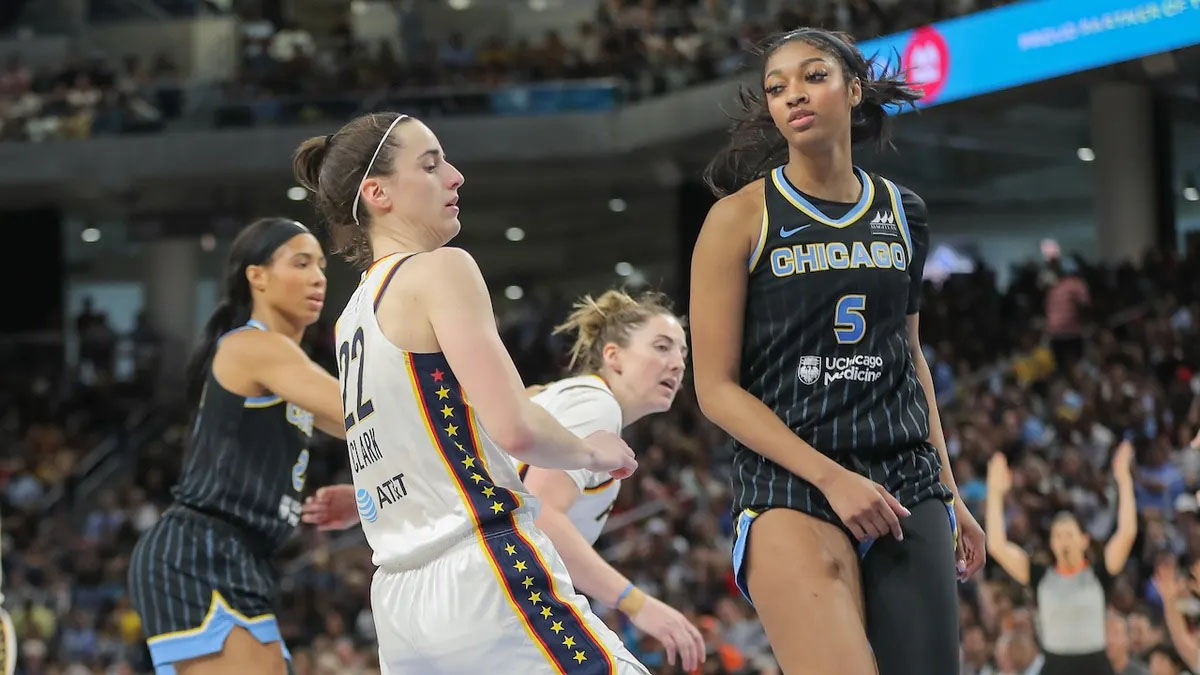
Photo Credit:Emilee Chinn/Getty Images
Two years ago, if someone had asked me to name a WNBA player, I would’ve drawn a blank. I barely knew the league existed, let alone followed it. Fast forward to now, and I’m refreshing box scores, streaming games, and fully immersed in the league, thanks to one name, Caitlin Clark.
It all started when I stumbled upon a clip of her on TikTok. She had that Stephen Curry-like range, draining deep threes, directing the floor with sharp court vision, and playing with an intensity that demanded attention. What stood out wasn’t just her skill but how confidently she carried herself in a game that, for so long, hadn’t received the attention it deserved. I began watching more of her college games, learned about the Iowa Hawkeyes, and before I knew it, I was tuned in every time she played.
But Caitlin’s story isn't complete without mentioning Angel Reese.
Their rivalry began during the 2023 NCAA women’s basketball championship, when Reese’s LSU team defeated Clark’s Iowa. Reese’s now-iconic “You can’t see me” taunt at the end of that game sparked nationwide debate. Some applauded her fire; others condemned her for what they deemed unsportsmanlike conduct, exposing an ugly double standard. When Iowa got their rematch in 2024 and defeated LSU, fans lit
up social media again, proving this wasn’t just a game anymore, it was a spectacle. And whether they asked for it or not, Clark and Reese had become the face of a new era in women’s basketball.
Both were later drafted into the WNBA, Clark going first overall to the Indiana Fever and Reese picked seventh by the Chicago Sky. The rivalry continued into the league. Their first WNBA faceoff was as heated as expected, especially after Chicago guard Chennedy Carter delivered a controversial body-check on Clark that wasn’t called a foul during the game. Footage later showed Angel Reese cheering from the sidelines, which further fueled public tension between the two camps.
The media pounced. Social feeds exploded. Clark fans felt she was being targeted unfairly. Reese fans defended her as playing with the same grit and intensity men have always been celebrated for. The rivalry, originally a sports storyline, began to morph into something darker, bordering on obsession.
Both players have tried to steer the conversation back to basketball. Clark referred to the foul as “just a basketball play,” downplaying the incident. Reese, when asked, kept her response brief: “Basketball play. Refs got it right. Move on.” Yet, the rivalry remains magnified, not because of what they say, but because of how fans and media amplify it.
Let’s be clear: rivalries are good for sports. They pull people in. From Ronaldo vs. Messi in football, to Serena vs. Sharapova in tennis, to Magic vs. Bird in the NBA, iconic rivalries have a history ofelevating leagues and players. The WNBA is no exception, and the Clark-Reese dynamic has undoubtedly drawn millions of new eyes to the league. That’s worth celebrating.
But what’s not worth celebrating is how this rivalry has become a gateway for hate, misogyny, and racism. Instead of a healthy competitive narrative, fans have turned it into a battleground. Social media timelines are filled with harassment, death threats, and deeply racist vitriol, most of it targeted at Black women in the league.
The toxicity reached a boiling point when the Connecticut Sun eliminated the Indiana Fever from playoff contention. After the game, veteran forward Alyssa Thomas didn’t hold back. “Honestly, it’s been a lot of nonsense,” she said. “In my 11-year career, I’ve never experienced the racial comments from a fanbase like I have from Indiana. There’s no place for that. We’ve been professional, but I’ve never been called the things I’ve been called on social media.”
She wasn’t alone. Shortly after, Connecticut’s DiJonai Carrington posted screenshots of racist hate mail she received in her inbox, messages too vile to repeat.
This is where we have to draw the line. The WNBA is finally getting the attention it’s long deserved. Viewership is up. Tickets are selling out. Jersey sales are booming. People are watching not just for Caitlin or Angel, but for A’ja Wilson, Breanna Stewart, Sabrina Ionescu, Napheesa Collier, and so many other incredibly talented players who have been carrying the league for years.
But if we allow racism, bullying, and harassment to fester under the guise of “sports rivalry,” we risk losing the very progress we’ve made.
It’s okay to have favorites. It’s okay to debate stats and team matchups. It’s okay to root hard for your player. But it is never okay to send threats, spread hate, or weaponize race and gender to tear athletes down, especially not in a league that is built on resilience, diversity, and the fight for equity.
As fans, our responsibility is to uplift the sport, not destroy it. Let’s not allow a powerful moment for women’s basketball to be overshadowed by hate. Let the rivalry thrive on skill, fire, and competition—not division and cruelty.
The WNBA is having its moment. Let’s not ruin it.